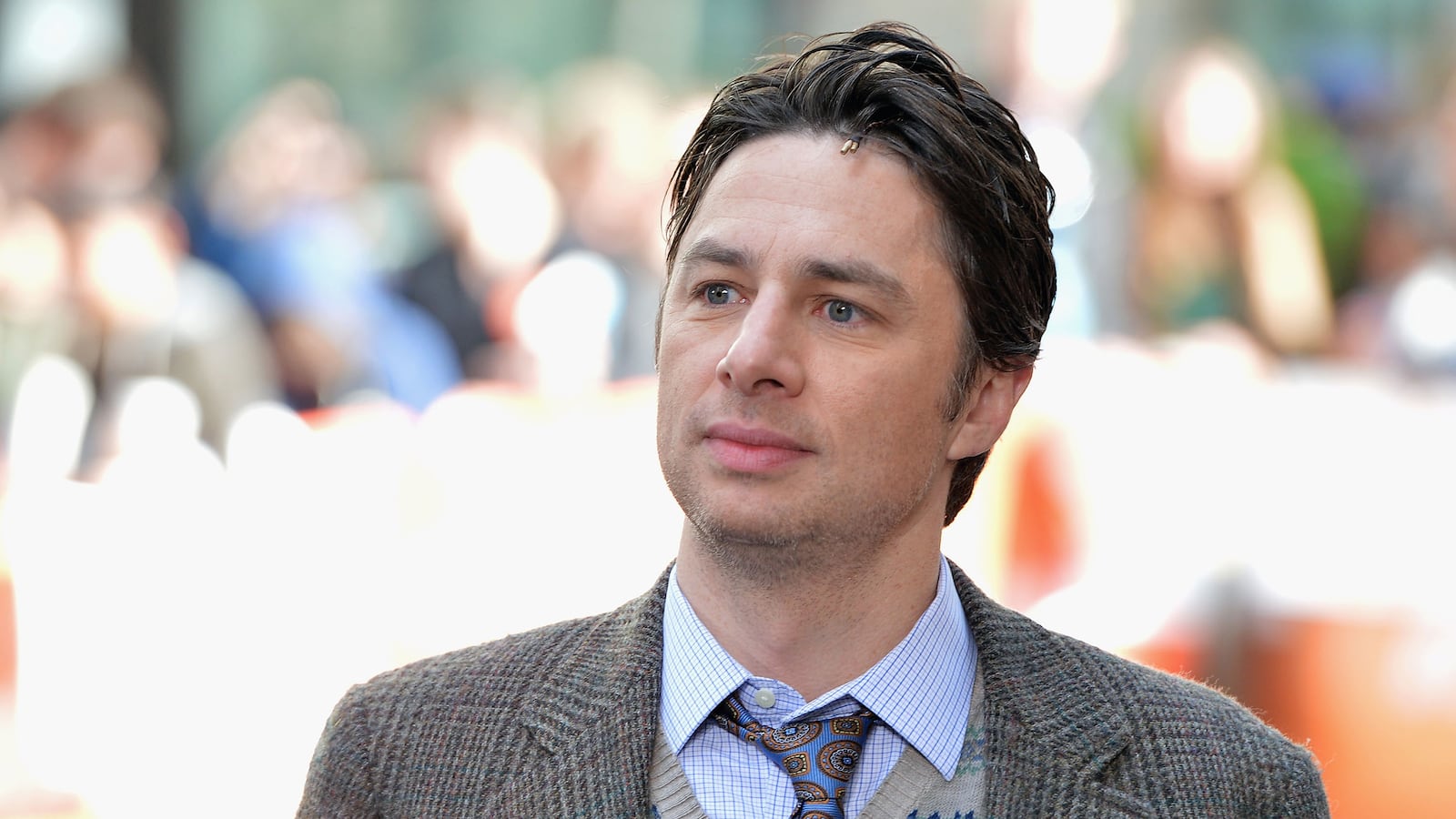Oh, Zach Braff—how do I loathe thee? Let me count the ways.

I admit I’ve never been much of a Braff fan. Scrubs—the wacky NBC-ABC medical sitcom that gave Braff his big break—wasn’t really my thing. And Braff’s directorial debut Garden State (2004) was less than my thing. As a fellow New Jersey half-Jew with a soft spot for indie rock, I bristled at a movie that took several of the basic building blocks of my own identity and made something aggressively mediocre out of them. Watching it felt like an insult.
That said, Braff has always seemed like a minor irritant, and I never gave any real thought to why he bugged me. Most of the time I didn’t even remember he existed. But now all of that has changed. On Friday, Braff returns to the big screen with Wish I Was Here, his long-“awaited” follow-up to Garden State. It is such an irritating movie that it has had the effect of clarifying, once and for all, why Braff himself is bothersome.
Let me start by saying that my problem with Braff has nothing to do with how he made Wish I Was Here. Not everyone agrees. In April 2013, Braff announced on the crowdfunding website Kickstarter that he was seeking $2 million in financing for his new project. He raked in $3.1 million from 46,000 donors within the next 48 hours.
Braff’s success provoked some backlash—to put it mildly. “There’s a lot of talk about the spirit of crowdfunding, and how it’s one of the few ways that a truly independent artist can fund their project,” The Guardian wrote. “But if the likes of Zach Braff can hijack the process, then surely the system is compromised? And what’s to stop the producers of the next Iron Man movie asking for a couple of million?”
[Braff] has numerous ways to produce capital, including his own bank account—as an actor on the (since canceled) TV show Scrubs, [he] was reportedly paid $350,000 per episode,” Chuck Klosterman added. “He appears to be asking for help he does not need.”
“It seems weird to be taking money from fans to create something,” Seth Rogen concluded. “If your movie is remotely good you can probably get someone to give you money for it.”
But my feeling is that if people are so bewitched by the idea of another Zach Braff joint that they’re willing to fork over their hard-earned cash to finance it, then that’s their glitch. No one was forcing these folks to pay up.
The real problem is what Braff made with all that money once he got it. You can (theoretically) create a good movie with Kickstarter donations; you can also create a bad one. Wish I Was Here is bad. What’s worse is that it’s bad in precisely the way that you would expect a movie by a young, rich actor who went panhandling on Kickstarter to be.
That’s because it may be the most entitled movie I’ve ever seen.
The plot of Wish I Was Here is fairly simple to sum up. Struggling 35-year-old actor Aidan Bloom (Braff) and his wife, Sarah (a sensitive Kate Hudson), live in Los Angeles with their two children, Grace and Tucker. Sarah supports the family with her public-service job while Aidan “pursues” his “dream.” But when Aidan’s father, Gabe (a prickly Mandy Patinkin), is diagnosed with cancer, the old man can no longer afford to pay for Grace and Tucker’s private schooling at the local yeshiva. Aidan must suddenly confront his two greatest fears. Has the time come for me to give up on my dream and get a real job? he wonders. Also, does this mean I have to send my kids to—gasp!—a poorly rated public school?
If you’re thinking “Hey, that sounds like a pretty solid setup for a film about one man’s overripe sense of entitlement and how he gets past it,” I sympathize. That’s what I was thinking, too. In the first act of Wish I Was Here, pretty much everyone—his father, Gabe, his bachelor brother Noah (Josh Gad), the prehistoric local rabbi—tells Aidan that he needs to bail on the acting and buckle down in a cubicle somewhere. For a while, it seems as if Braff is gearing up to make the kind of generational statement that he vaguely gestured at in Garden State—i.e., that he’s going to critique a narcissistic Millennial cohort widely seen as too puffed up on self-esteem for its own good. But it turns out that Braff isn’t really interested in satirizing Aidan’s sense of entitlement at all—mostly because he appears to suffer from it himself.
The story bears this out. Kvetching when anyone suggests that he should send out some resumes—“Doesn’t God believe in my pursuit of happiness?” he whines to the rabbi—Aidan refuses to step up financially for his family, choosing to withdraw his kids from yeshiva and home-school them for the rest of the year instead. By any objective standard, this does not go very well. First he duct-tapes Grace and Tucker to a chair and forces them to watch Reading Rainbow reruns while he rehearses for an audition; then he uses them to help rebuild a fence and re-plaster the pool. When Aidan takes his progeny on a whimsical “field trip,” they drive hundreds of miles to revisit the rock in the desert where he had his “last epiphany.” And when Grace notices an old photo of grandpa posing in front of the flashy 1964 Chevy he could never afford, Aidan isn’t inspired to give his dying father one last gift by renting a vintage model for him; he simply rushes out to test-drive his own dream car, an Aston Martin Volante.
We’re supposed to think that Aidan is teaching Grace and Tucker a more important lesson than mere geometry in these scenes; we’re supposed to think he’s teaching them about, you know, Life. But as far as I can tell, the only lesson Aidan’s kids could possibly be picking up in his impromptu classroom is that everything—their grandfather’s death, their education—is actually about Aidan’s quest for self-actualization, fulfillment, and fewer chores to do around the house. Weirdly, Braff isn’t aware that there’s a difference. The only reason Aidan’s adoring, compliant, algorithmically quirky offspring seem to exist is to reflect how awesomely unconventional their dad is.
Aidan’s dynamic with his wife is even ickier. Early on, Sarah asks Aidan, “When did this relationship became solely about me supporting your dream?” It’s a good question. I mean, why should we root for Aidan to reach for the stars when his spouse hasn’t been afforded the same privilege? But Wish I Was Here never bothers to answer it. It's not just that Aidan shows zero interest in Sarah’s ambitions. (He ignorantly assumes that she “loves” her data-inputting job at the Water Department, then asks, “What do you want to do, anyway?” when she corrects him.) It's that he makes zero effort to help her achieve them even after she says she’s dissatisfied. At one point, Aidan actually leaves Sarah a note saying he will “always believe in her dreams” or something—and encloses, like, 40 bucks so she can “get a massage.” What that has to do with Sarah’s work-life balance is beyond me. But Hudson glows. Her character seems to think the problem has been solved... because that’s what Braff seems to think, too.
In the end, that’s why the guy is so grating: His movies constantly assume they’re entitled to emotional responses they haven’t earned. When critics complain that Braff’s work is “twee” or “sappy,” this is what they’re complaining about. Wish I Was Here is no exception. Gabe keeps every contact lens he’s ever worn in a jar next to his favorite armchair because he wants to remember the things he’s seen; Grace gives her deathbed-bound grandfather a pair of welding goggles so he can “find grandma” when he goes “into the light.”
Braff is striving to convey a poignant blend of pathos and humor here, but his sort of striving is a form of cheating. Instead of creating characters who are worth caring about—characters who are funny because they’re true—he sketches out some convenient ciphers and loads them up with lots of self-congratulatory quirks (rather than giving them, say, personalities). Every time Braff proudly flaunts another eccentricity—the rabbi who steers his Segway straight into a hospital wall—he is reminding us that his characters don’t resemble people at all, and that, as a result, they don’t really deserve the laughter or tears they’re laboring so mightily to elicit. Braff’s infamous, incessant soundtracks—which one Wish I Was Here reviewer likened to “a Believer compilation” full of “the best indie rock of 2006"—work the same way: by trying to trick viewers into experiencing emotions his stories don’t justify.
Braff has said Woody Allen is his hero. This makes sense: They’re both Jewish, they’re both humorists, and they both write, direct, and act. But ultimately, the comparison is misleading. At his finest, Allen marshaled his own idiosyncrasies to send up the idiosyncrasies of his generation; Braff simply illustrates his generation’s sense of entitlement without seeming to realize it. Braff’s fellow auteurs Lena Dunham (Girls) and Louis C.K. (Louie) are more fitting heirs to Allen’s throne. At least they satirize entitlement instead of unwittingly enacting (and celebrating) it.
I don’t really loathe Zach Braff. In fact, I kind of admire his chutzpah; the reason he waited a decade to make another movie after Garden State—and the reason he resorted to Kickstarter to do it—is that he didn’t want a bunch of meddling studio executives to muck up his vision. “I can say wholeheartedly that [Wish I Was Here] is a full articulation of what we wanted to say,” he recently told The New York Times.
The only problem with that, of course, is that we now know—fully, wholeheartedly—what Braff wants to say. It isn’t much.





